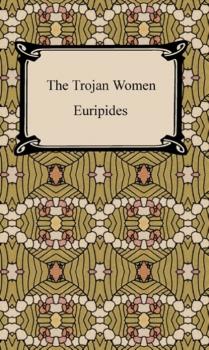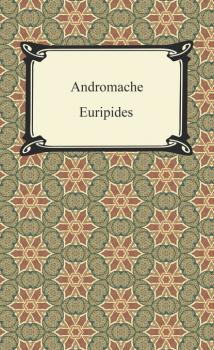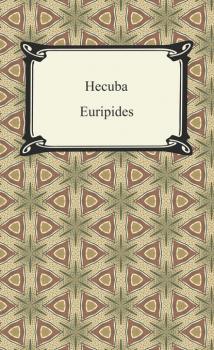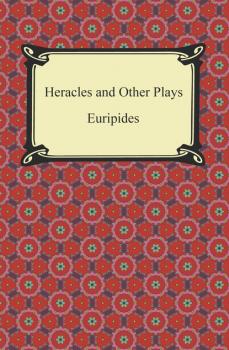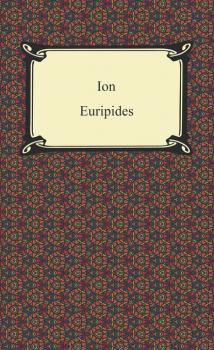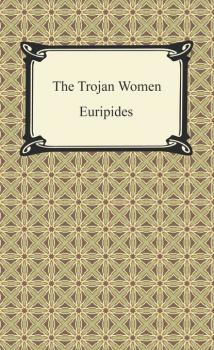ТОП просматриваемых книг сайта:
Euripides
Список книг автора EuripidesАннотация
Though little is known for certain of his early life, Euripides was probably born around 460 b.c.e. to the farmer Mnesarchus and his wife Clito, and his studious nature quickly led him to a literary life in Athens. His work sticks out from that of his contemporaries for his attention to the political and social problems around him, although he never held public office. His plays are often ironic, pessimistic, and display radical rejection of classical decorum and rules. «The Suppliants» is one of Euripides' anti-war plays, and deals with a common Greek theme of leaving an enemy's dead body unburied. This story, about Adrastus and the Argive mothers against Creon of Thebes, explores the inhumanity of war, grief, and the merits and demerits of responsible government. It also points out some positive results of peace such as economic prosperity, improved education and the arts.
Аннотация
Euripides, along was Sophocles and Aeschylus, is largely responsible for the rise of Greek tragedy. It was in the 5th Century BC, during the height of Greece's cultural bloom, that Euripides lived and worked. Of his roughly ninety-two plays, only seventeen tragedies survive. Both ridiculed and lauded during his life, Euripides now stands as an innovator of the Greek drama. Collected here are four of Euripides' tragedies: «Alcestis», «Medea», «The Heracleidae», and «Hippolytus». «Alcestis» follows Ardemus' attempt to rescue his beloved wife Prince Alcestis in Hades. «Medea» tells the horrific tale of a woman who seeks revenge on her husband by killing her children. «The Heracleidae» is a tragedy of justice and virtue involving the children of the great Heracles. Lastly, «Hippolytus» tells of Hippolytus, son of Theseus, and his tragic fall at the hands of Phaedra. For the lover of drama and the ancient world, this collection is not to be missed—Euripides is seen here in all of his valor and brilliance.
Аннотация
Euripides, the youngest of the trio of great Greek tragedians was born at Salamis in 480 B.C., on the day when the Greeks won their momentous naval victory there over the fleet of the Persians. The precise social status of his parents is not clear but he received a good education, was early distinguished as an athlete, and showed talent in painting and oratory. He was a fellow student of Pericles, and his dramas show the influence of the philosophical ideas of Anaxagoras and of Socrates, with whom he was personally intimate. Like Socrates, he was accused of impiety, and this, along with domestic infelicity, has been supposed to afford a motive for his withdrawal from Athens, first to Magnesia and later to the court of Archelaues in Macedonia where he died in 406 B.C.
Euripides's «Hippolytus» is the story of its title character, the son of Theseus and Hippolyta, who has scorn love and devoted himself to hunting and the Goddess of the hunt, Artemis. For this, Aphrodite, the Goddess of love has sought to destroy Hippolytus.
Euripides's «Hippolytus» is the story of its title character, the son of Theseus and Hippolyta, who has scorn love and devoted himself to hunting and the Goddess of the hunt, Artemis. For this, Aphrodite, the Goddess of love has sought to destroy Hippolytus.
Аннотация
"In his clear preface, Gilbert Murray says with truth that The Trojan Women, valued by the usage of the stage, is not a perfect play. «It is only the crying of one of the great wrongs of the world wrought into music.» Yet it is one of the greater dramas of the elder world. In one situation, with little movement, with few figures, it flashes out a great dramatic lesson, the infinite pathos of a successful wrong. It has in it the very soul of the tragic. It even goes beyond the limited tragic, and hints that beyond the defeat may come a greater glory than will be the fortune of the victors. And thus through its pity and terror it purifies our souls to thoughts of peace." So begins the introduction to «The Trojan Women» by Euripides as translated by Gilbert Murray.
Аннотация
Euripides (480 BC-406 BC) is revered as one of the three great tragedians of classical Athens, along with Aeschylus and Sophocles, and produced the largest body of extant work by any ancient playwright. He is considered to be the most modern of the three, and his works laid the foundation for Western theatre. Euripides turned to playwriting at a young age, achieving his first victory in the dramatic competitions of the Athenian City Dionysia in 441 b.c.e. He would be awarded this honor three more times in his life, and once more posthumously. Written about ten years after the Trojan War, «Andromache» may be a bitter attack on the Trojan national character. Andromache has been given as a slave and concubine to Neoptolemus, son of Achilles, and incurs the wrath of his barren wife, Hermoine, when she becomes pregnant. The plot illustrates a sophistry, cowardice and violence in the Spartans.
Аннотация
Euripides turned to playwriting at a young age, achieving his first victory in the dramatic competitions of the Athenian City Dionysia in 441 b.c.e. He would be awarded this honor three more times in his life, and once more posthumously. His works are characterized by their moral ambiguity, plots of intrigue, and often a separate character (usually a deity) who introduces the play with an explanatory prologue. «Hecuba» was written around 424 b.c.e., and is considered to be one of Euripides' most bleak works. In the aftermath of the Trojan War, Hecuba, the wife of Trojan King Priam, finds herself in a state of utter desolation. Her husband and sons have been killed, and her daughters either slain or given as concubines to Greek kings, and she herself has been given to the hated Odysseus. From this beautifully penned story of destruction, loss, revenge, and the consequences of war has risen one of the most tragic figures in classical literature.
Аннотация
Euripides, along was Sophocles and Aeschylus, is responsible for the great rise of Greek tragedy. It was in the 5th Century BC, during the height of Greece's cultural bloom, that Euripides lived and worked. Of his roughly ninety-two plays, only seventeen tragedies survive. Both ridiculed and lauded during his life, Euripides now stands as an innovator of the Greek drama. Here, in «Heracles and Other Plays», we witness Euripides at the heights of his dramatic power. «Heracles» dramatizes the story of the great Greek hero and his maddened desire to murder his wife and children. Saved by the graces of his friendship with Theseus, «Heracles» examines family, heroism, and violence in a masterful way. «Iphigenia Among the Taurians» is a thrilling tale set on the Black Sea which examines Greek and Barbarian cultures, «Ion» tracks the orphan Ion through a web of betrayal, revenge, and reconciliation. «Helen» picks up after the fall of Troy and liberally rewrites the standard myth of Helen, and lastly, «The Cyclops» expertly dramatizes the famed episode in Homer's «Odyssey». For the lover of drama and the ancient world, this collection is not to be missed—Euripides is seen here in all of his valor and brilliance.
Аннотация
Euripides (480 BC-406 BC) is revered as one of the three great tragedians of classical Athens, along with Aeschylus and Sophocles, and produced the largest body of extant work by any ancient playwright. He is considered to be the most modern of the three, and his works laid the foundation for Western theatre. «Ion» interprets the legend of the orphan Ion, who was conceived from the rape of Creusa by the god Apollo. Creusa is determined to keep the rape secret, and leaves the baby for dead. The baby is rescued by Hermes, and raised by a Pythian Priestess in Delphi. Many years later, when Creusa and her husband Xuthus visit the oracles at Delphi, the mother and son are reunited under false pretenses. The ensuing story of betrayal, revenge and reconciliation exemplifies Euripides' clever ability to question the roles and fallibility of the gods in an emotional and beautifully written tale.
Аннотация
Though little is known for certain of his early life, Euripides was probably born around 460 b.c.e. to the farmer Mnesarchus and his wife Clito, and his studious nature quickly led him to a literary life in Athens. His work sticks out from that of his contemporaries for his attention to the political and social problems around him, although he never held public office. His plays are often ironic, pessimistic, and display radical rejection of classical decorum and rules. «The Trojan Women» is one of Euripides' anti-war plays, set in Troy just after it has been captured by the Greeks in a bitter, ten-year war. The play is not particularly suspenseful, but instead it relies on passages of lyric lamentation in the form of songs by Hecuba and other women who face cruel servitude in Greece. It is a powerful tragedy that emphasizes the sufferings of the innocent victims of war.
Аннотация
Euripides, along was Sophocles, and Aeschylus, is largely responsible for the rise of Greek tragedy. It was in the 5th Century BC, during the height of Greece’s cultural bloom, that Euripides lived and worked. Of his roughly ninety-two plays, only seventeen tragedies survive. Both ridiculed and lauded during his life, Euripides now stands as an innovator of the Greek drama. Collected here are six of Euripides’ tragedies in prose translation by Edward P. Coleridge: “Medea”, “Hippolytus”, “Hecuba”, “Electra”, “Heracles”, and “Helen”. The first play in this collection, “Medea”, tells the horrific tale of a woman who seeks revenge on her husband by killing her children. “Hippolytus” relates the tragedy of its titular character, son of Theseus, and his tragic fall at the hands of Phaedra. “Hecuba” is the tale of a fallen Queen, the grief she feels for the death of her daughter, and the revenge she takes for the murder of her son. In “Electra” we find the daughter of a slain king plotting her revenge. In “Heracles” we find a hero racing to save his family from a death sentence. Lastly, “Helen” presents an alternate tale regarding Helen of Troy than that which sparked the Trojan War. For the lover of drama and the ancient world, this collection is not to be missed—Euripides is seen here in all of his valor and brilliance. This edition includes a biographical afterword.




